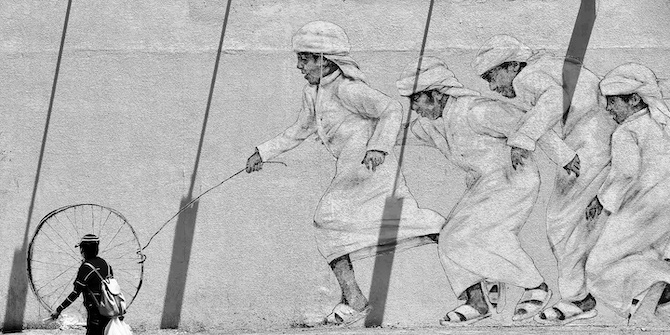by Mira Al-Hussein

Much excitement surrounded Dubai’s ruler, Sheikh Mohammed bin Rashid’s call for Emirati graduates to become the world’s youngest minister back in 2016. Source: Feroze Edassery/Shutterstock
On 3 February 2016, Dubai’s ruler, Sheikh Mohammed bin Rashid, took to Twitter to launch a local quest for an under-25, Emirati graduate to serve as the world’s youngest minister representing the country’s youth. He invited UAE universities to nominate six graduates – three females, and three males – from whom the new minister would be selected. Much anticipation followed the announcement, all of which was deflated by the official appointment of the minister a week later.
The chosen minister was indeed an accomplished young woman, with degrees from top tier universities under her belt. Well-liked by her peers, the young minister appeared to be an obvious choice, having been groomed for the role for years prior to her appointment. What, then, was the cause of the expectedly silent but overwhelming disappointment?
Although the initial announcement had invited all UAE universities to each nominate their candidates, it soon became obvious that the candidate had already been picked. The new Minister for Youth had benefited from a private education at one of the country’s elite branch campuses, and went on to earn a postgraduate degree at another renowned institution overseas – two avenues that are not easily accessible to many Emiratis, either due to economic constraints, or social restrictions that especially limit women’s choices.
The UAE maintains a dual system for higher education. Free higher education that is delivered through federal universities is exclusive to Emiratis while private universities are open to all fee-paying students. This dual system of higher education has resulted in a class divide, not between the haves and have nots, but between the educated and the under-educated. Emiratis graduating from federal universities are becoming aware of the uncomfortable reality that they are increasingly being snubbed in favour of graduates who hold degrees from private or overseas institutions. The promise of a rewarding university education seems to hang by a thin thread of diminishing privileges.
There has been growing apprehension among young Emiratis at the grim prospects awaiting them upon graduation. Twitter is rife with aggrieved Emiratis, disgruntled at their inability to find employment. A recent Twitter post by an Emirati jobseeker went viral, triggering a national debate on unemployment and Emiratisation. But the debate was about more than just an unemployment crisis.
Last year, the UAE introduced major social and legal reforms as a way to make the country more appealing to its majority expatriate population following a rough year that saw an exodus of many due to COVID-related job losses. The reforms, described as secular-leaning, were contentious among the largely conservative population of Emiratis. More so, however, was this year’s announcement that the country will now offer citizenship to talented expatriates.
The country’s fixation on attracting foreign talent has brought to the fore some perplexing questions about the country’s education system and creative environment. Whereas the country looks at attracting talent as a quick-fix for a presumed deficit, and a means to boost its post-oil economic diversification plans, Emiratis are alarmed at the inevitability of being crowded out of the job market. An Emirati social commentator summed up this dilemma in a Twitter post in which he described the expected competition that Emiratis will face when applying for ‘preparatory’ jobs: ‘We continue to pin our hopes on the nationalisation law that can end the debate on providing jobs for our children.’ Emiratis will now have to navigate two challenges at once: competing with foreign talent and naturalised Emirati talent.
Perhaps as a response to growing discontent, the UAE recently announced (12 September) that it was incentivising the private sector with a $7 billion package to ‘absorb’ 75,000 Emirati graduates, with the government supplementing their salaries.
But nationalisation may not be the answer to the talent gap that the government is keen to remedy by the series of landmark announcements. There is a specific type of talent that the country wants to attract, and it is one that has been cultivated outside of its constraining borders. Talent can only be fostered in an environment conducive to learning, innovation and creativity – an environment that no Arab country at the moment can provide or sustain.
It is time to admit that the post-Arab Spring paranoia that had gripped the country has had detrimental effects on its higher education sector. In addition to pre-existing structural challenges that have long hamstrung the development of a robust higher education sector, such as the overall precarity of jobs that are tied to visa renewals, and the corporatisation of academia, the sector has not kept up with inflation. While international academics are generally mobile, a considerable number of academics have been steadily leaving the country for better economic incentives and more nurturing environments.
But remuneration is not the only pull factor. The extremely long and tedious process of obtaining security clearances to host or employ academics has been a deterrent too. Academia, by virtue of its core functions, is a space for constructive criticism and reflection. We cannot claim to aspire for innovation and creativity by curtailing the core functions of higher education. For a country with global ambitions, it has insulated the sector that matters most.
Attracting foreign talent may work momentarily; talent is a mobile commodity after all. But imported talent needs the right environment to thrive. The country has been hinging on the false hope that it can import world class institutions and established academics who can deliver ideology-free education that will yield the same results as it does in advanced economies. But its aggressive orientation towards attracting foreign talent indicates that it may have arrived at the logical conclusion that talent under its restrictive environment cannot be fostered.
This leaves Emiratis at a particular disadvantage. While private universities and branch campuses enjoy a relatively higher degree of autonomy, federal universities have been overly regulated and too prescriptive in their instructions. Private institutions continue to deliver an education that is customised for a predominantly expatriate and mobile population. Expatriates’ perceived guesthood in the country creates the demand for quality education, which can be gauged against students’ ability to secure admissions for postgraduate studies at overseas institutions in the West. The same demand is absent in federal institutions, whose function has been reduced to citizen-building rather than talent-fostering.
It is perhaps time for the Ministry of Education to rethink its post-oil vision and the ineffective strategy of maintaining a dual higher education system that has contributed to creating an unemployment problem for both Emirati and local graduates.







Few private universities exist in China, but similiarly, graduates from Western universities are indeed more competitive in Chinese job market than graduates from Chinese public universities. Additionally, more and more Western universities are opening branches in China, such as Duke University in Kunshan, Nottingham University in Ningbo and New York University in Shanghai. To some extent, this phenomenon could also exacerbate the class division in China.
Excellent summary of the current state of affairs. And unfortunately, the trend is towards federalization of the private universities, too.
I like how you summed up the education dilemma and highlighted the risk of the current approach.